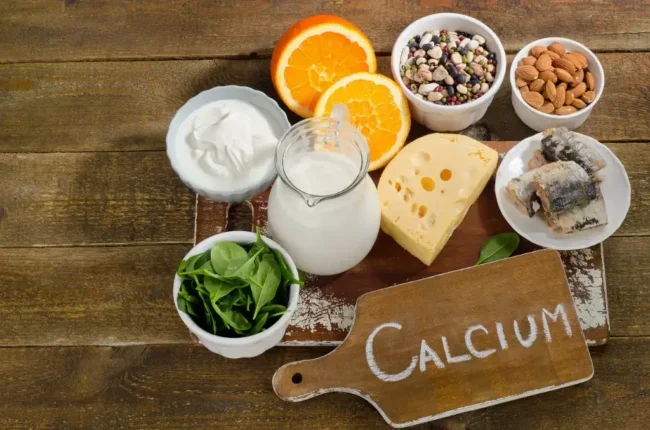Natural sources of calcium supplements are essential for women’s health, especially to support bone health and prevent osteoporosis. Here are some calcium-rich foods and supplements suitable for women:
Dairy Products such as:
Dairy products are indeed a rich source of calcium. Here are some common dairy items that provide calcium:
- Milk: Cow’s milk is a primary source of calcium. However, alternative milk options like almond milk, soy milk, and fortified coconut milk can also provide calcium.
- Yogurt: Plain yogurt or Greek yogurt contains calcium and is also a good source of protein.
- Cheese: Varieties such as cheddar, mozzarella, feta, and cottage cheese contain calcium. However, some cheeses may have higher calcium content than others.
- Buttermilk: This fermented dairy product is rich in calcium and also provides probiotics that can benefit digestive health.
- Kefir: Similar to yogurt, kefir is a fermented dairy product that contains calcium along with beneficial probiotics.
Leafy Greens such as:
Leafy greens offer numerous health benefits, making them an essential component of a balanced diet. Here are some of the benefits of including leafy greens in your diet:
- Rich in Nutrients: Leafy greens are packed with essential vitamins and minerals, including vitamin A, vitamin C, vitamin K, folate, iron, calcium, and potassium. These nutrients are vital for overall health and well-being.
- High in Fiber: Leafy greens are an excellent source of dietary fiber, which is essential for digestive health. Fiber helps promote regular bowel movements, prevents constipation, and supports a healthy gut microbiome.
- Low in Calories: Most leafy greens are low in calories but high in volume, making them ideal for weight management and promoting feelings of fullness without excess calorie intake.
- Antioxidant Properties: Many leafy greens contain antioxidants such as beta-carotene, lutein, and zeaxanthin, which help protect cells from damage caused by free radicals. Antioxidants have been linked to a reduced risk of chronic diseases such as heart disease, cancer, and age-related macular degeneration.
- Support Heart Health: Leafy greens are rich in potassium, which helps regulate blood pressure and maintain a healthy cardiovascular system. Additionally, their high levels of dietary nitrates may help lower blood pressure and improve blood vessel function.
- Bone Health: Leafy greens like kale, spinach, and collard greens are excellent sources of calcium and vitamin K, both of which are essential for bone health. Adequate intake of these nutrients can help prevent osteoporosis and maintain strong, healthy bones.
- Anti-Inflammatory Effects: Some leafy greens, such as spinach and kale, contain compounds with anti-inflammatory properties that may help reduce inflammation in the body and lower the risk of chronic diseases associated with inflammation.
- Blood Sugar Regulation: The fiber and antioxidants found in leafy greens may help regulate blood sugar levels, reducing the risk of type 2 diabetes and improving insulin sensitivity.
Fish with Edible Bones such as:
Fish with edible bones are a good source of calcium and other nutrients. When consuming fish with edible bones, you’re getting both the calcium from the bones and the nutritional benefits of the fish itself. Here are some examples of fish with edible bones:
- Canned Salmon: Canned salmon is often sold with the bones, which are soft and can be mashed easily. These bones are a good source of calcium.
- Canned Sardines: Sardines are small fish that are typically eaten whole, including the bones. They are rich in calcium, omega-3 fatty acids, and vitamin D.
- Anchovies: Anchovies are commonly used in sauces, dressings, and as a pizza topping. They are usually consumed whole, including the bones, and provide calcium along with omega-3 fatty acids.
- Canned Mackerel: Like salmon and sardines, canned mackerel often contains soft edible bones that provide calcium.
- Smelt: Smelt are small fish that are often consumed whole, including the bones. They are a good source of calcium and omega-3 fatty acids.
Nuts and Seeds such as:
Nuts and seeds are not only delicious but also provide a variety of essential nutrients, including calcium. Here are some nuts and seeds that are good sources of calcium:
- Almonds: Almonds are among the richest sources of calcium among nuts. They also contain healthy fats, protein, and fiber.
- Sesame Seeds: Sesame seeds are packed with calcium and are commonly used in cooking, baking, and as a topping for salads and other dishes.
- Chia Seeds: Chia seeds are an excellent source of calcium, as well as omega-3 fatty acids, fiber, and antioxidants.
- Flaxseeds: Flaxseeds are rich in calcium and provide additional benefits such as omega-3 fatty acids and lignans, which have antioxidant properties.
- Sunflower Seeds: Sunflower seeds are a good source of calcium and are also rich in vitamin E, magnesium, and other nutrients.
- Poppy Seeds: Poppy seeds contain calcium and are often used in baked goods and as a topping for bread and bagels.
Beans and Legumes such as:
Beans and legumes are nutritious foods that offer various health benefits, including being a good source of calcium. Here are some examples of beans and legumes that provide calcium:
- White Beans (Navy Beans): White beans are high in calcium and also provide a good amount of protein and fiber. They can be added to soups, stews, salads, or mashed and spread on toast.
- Black Beans: Black beans are not only rich in calcium but also contain antioxidants, protein, and fiber. They are commonly used in Mexican and Latin American dishes like tacos, burritos, and salads.
- Chickpeas (Garbanzo Beans): Chickpeas are versatile legumes that are rich in calcium, protein, and fiber. They are commonly used in Mediterranean cuisine, such as hummus, falafel, and salads.
- Lentils: Lentils are a good source of calcium, as well as protein, fiber, and various vitamins and minerals. They come in different varieties such as green, brown, red, and black, and can be used in soups, stews, salads, and curries.
- Soybeans: Soybeans are unique among legumes because they are a complete protein, meaning they contain all the essential amino acids. They are also high in calcium and can be consumed in various forms, including tofu, tempeh, edamame, and soy milk.
- Kidney Beans: Kidney beans are another good source of calcium and are often used in chili, soups, and salads.
Fortified Foods such as:
Fortified foods are products that have additional nutrients added to them that aren’t naturally present or are present in insufficient amounts. Calcium-fortified foods are particularly beneficial for individuals looking to increase their calcium intake.
Here are some common examples of foods that are often fortified with calcium:
- Fortified Plant-Based Milk: Many plant-based milk alternatives, such as almond milk, soy milk, oat milk, and rice milk, are fortified with calcium and other nutrients to make them nutritionally similar to cow’s milk.
- Fortified Orange Juice: Some brands of orange juice are fortified with calcium and vitamin D, providing an easy way to boost your calcium intake, especially for those who do not consume dairy products.
- Fortified Breakfast Cereals: Certain breakfast cereals, including both hot and cold varieties, are fortified with calcium. Check the nutrition label to see if the cereal you choose contains added calcium.
- Fortified Tofu: Tofu made with calcium sulfate as a coagulant is a good source of calcium. It’s commonly used in vegetarian and vegan diets as a substitute for meat or dairy products.
- Fortified Bread and Baked Goods: Some bread and baked goods, such as certain types of bread, English muffins, and tortillas, are fortified with calcium to increase their nutritional value.
- Fortified Plant-Based Yogurts: Similar to plant-based milk, some dairy-free yogurt alternatives are fortified with calcium and other nutrients to provide a dairy-free source of this essential mineral.
- Fortified Snack Bars and Energy Bars: Certain snack bars and energy bars are fortified with calcium, offering a convenient way to increase your intake of this important nutrient on the go.








